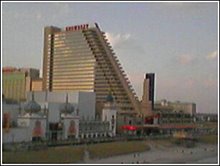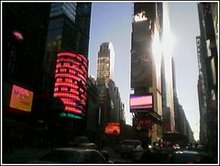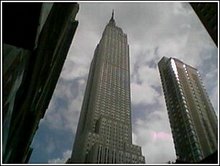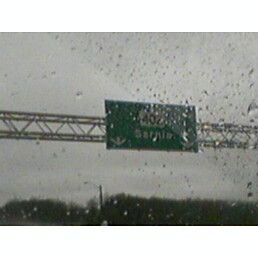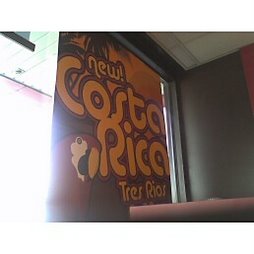Michael Richards was best known as a comic with a tremendous gift for physical comedy, so his transition to stand-up is the first thing that defies comprehension. His physical portrayal of Cosmo Kramer on the defunct Seinfeld series transcended the mundane and occasionally verged upon greatness. It could have been defined as an Upper West Side Manhattan take on the work of Jackie Gleason or possibly Sid Caesar.
Taking that into consideration, perhaps the hecklers had a valid point in letting him know that his stand-up routine left something to be desired. One would expect a solid stand-up gig from Jerry Seinfeld, but might risk disappointment when words to the effect of "formerly appeared on Seinfeld," appear on the showbill. The transition to standup is one which has vexed abler comic actors than Michael Richards.
The Outburst happened. However, Richards' unique position as third or fourth banana on a long running series might have allowed a more productive response to the aftermath. Consider John Amos' embrace of John Gotti, or more recently, the antics of such famous-for-being-famous types as Paris Hilton and Kate Moss.
Never complain, never explain.
The more Richards attempts to atone, the further his foot goes into his mouth. In an attempt to appease and reconcile with a segment of the afro-american population that will constantly find fault with anything he does from here on out, he has taken a craven tack. It should not be incumbent upon him to appease and reconcile until he gets an apology for being heckled.
There is no defense for the tenor of his outburst. Slurs and profanity are weak-minded substitutes for a pointed rejoinder, and high evidence of a poor performer using substandard material. It is the same kind of gutter material that earns other performers rebuke from able commentators for using "thrill words," as a substitute for talent.
The profane and vulgar expressions seen on 17 November were not with the ultimate goal of significant social observations of such talents as Lenny Bruce, George Carlin, Richard Pryor, Mel Brooks, Chris Rock, Denis Leary, or Dennis Miller. All of whom have approached the issue of race to varying degrees, and most of whom have uttered the same slur as Richards. It was the rant of a bitter (and probably very lonely) man who abandoned his decency while trying to pursue the remnants of his identity as a comic performer.
The hecklers are not entirely without culpability. Indeed, most rational people would abandon a performance they did not find entertaining. It is just as easy to walk out of a door as in through it. How much of an investment would it represent to cut one's losses and seek another option for being entertained?
They could have, most appropriately, approached the management of the Laugh Factory, and requested a refund because the performance failed to meet their expectations. Refund or not, then the management would be aware that something was amiss and the situation could be rectified. His business requires satisfied patrons, not customers heading elsewhere on the Sunset Strip due to a poor performance.
Hiring Gloria Allred and demanding mediation with unspecified damages in front of a retired judge evokes the worst kind of opportunism. A group of young people has little threat from a comedian in his late fifties. The man is clearly meshugginah, but whom could they demand apologies from next? A homeless person? The tire buster at a department store in Waycross?
The next caucasian who dares to exclaim anything beyond Kum-ba-yah in traffic?
The demands are from a perception of deep pockets. Are Michael Richards' pockets deeper than most? That's probable. Does he live in a country with a guarantee of free speech? Absolutely. No matter how one feels about what Michael Richards said, he has the right to say it. If he wishes to say that The Wandering Gentile may have an unnatural interest in furry woodland creatures, it's allowed in the Constitution.
What is not in the Constitution, and is pretty illegal, is the unauthorized use of a performer's image for profit. And Michael Richards, by virtue of his appearance on Seinfeld for eight seasons, is a recognizable figure who could reasonably be considered as having value while promoting an agenda. The taint of racism is applied with the accusation, and it does not come off with Clorox. His livelihood is destroyed beyond repair.
What Richards said is reprehensible, but he had the legal right to speak irresponsibly. Once he spoke irresponsibly, there is no injury nor tort that can be defined under the law. In publishing the material deemed offensive to certain populations, tangible harm has come to Michael Richards from the unauthorized and illegal use of his image. No contract exists that one will not be offended when entering a comedy club, be it tacit or explicit.
What is at stake is not the rant of a television actor in the twilight of a modestly successful career, but the ability to mock racism by exposing true racists. Mark Twain, William Faulkner, John Steinbeck, and Mel Brooks made significant progress by exposing bigots through the bigot's own words. As hurtful as the words are to hear, if one word is removed from our vocabulary, then all words and ideas are in danger.
To allow oneself the comfort of offense upon hearing a slur is a vanity that is not necessarily productive. To disallow anyone the right to a term based upon that individual's race without considering the individual's motives, or context is a censorship equal to Bowdler's devastation of Shakespeare. Free speech for all demands that disagreeable expression be openly brought to the table. It is the hallmark of American experience that has served our nation well for 230 years. Anything less is a push down a slippery slope.
The suggestion that one slur is a special case allows that one word to retain its power to polarize and destroy. It allows a population to hide behind the concept that racism and bigotry are the cause of individual failure, and impedes the actualization and realization of the talents of those who use racism as an excuse. Racism and bigotry do exist among whites of Michael Richards' age and older, but the scapegoating of caucasians among americans of african descent without regard to the individual's action or lack thereof in his or her own destiny is pervasive.
No cabal of caucasians can exist to achieve what black america has managed to do to itself, much as Bill Cosby has stated. The pursuit of excellence knows no boundary but the will of the individual. Permitting the hateful words of a fading celebrity to be hurtful is the hallmark of people who have a comfortable existence, not people who are oppressed.
Let Richards' hatred and anger wither, or not. But he has the right to his image and craft, a right which has been violated in the name of furthering the idea that his detractors are oppressed by the power of an ugly word that they provoked. His detractors are oppressing themselves, and dragging discourse back to the 1950s.
This is what Dr. King was martyred for?
29 November 2006
Subscribe to:
Comments (Atom)

